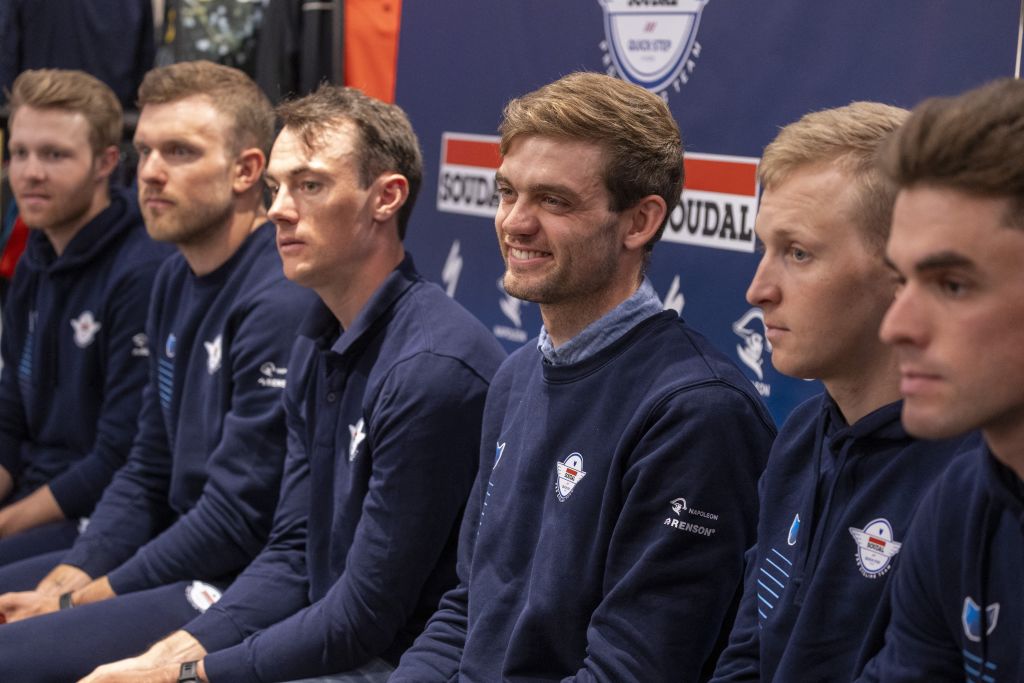
The Soudal-QuickStep's Classics squad believe they remain an underdog for Sunday’s Paris-Roubaix but with the experience and determination to try to take on Mathieu van der Poel and anyone else in the race.
Kasper Asgreen beat Van der Poel in a two-rider sprint to win the Tour of Flanders in 2021. The Dane has struggled to find the same form while Van der Poel seems on another planet. Yet Asgreen does not seem afraid of the World Champion and is hoping for a hard, selective race that opens up early on the cobbles of northern France.
“I’m happy to have beaten Mathieu once, but it doesn’t mean you’ll beat every time,” Asgreen said realistically as the Soudal-QuickStep team talked about their hopes and ambitions at the showroom of sponsor Safety Jogger on Thursday.
“I don’t think our role has changed. We are not the big favourites; we're still the underdog.
“We have seven cards to play, the seven riders in our team. Our strength is our experience, we have riders who have ridden and done well several times. Roubaix is a race where the strongest doesn't always win. You can go far into the race from a group that goes early. With experience you get far and see those tactical opportunities.”
Asgreen leads the Soudal-QuickStep team on Sunday. Yves Lampaert, Gianni Moscon, and Scheldeprijs winner Tim Merlier are also protected riders who could emerge during a selective race.
The simple question but the most difficult to answer is how to beat Van der Poel and his ever-more impressive Alpecin-Deceuninck team. Asgreen has his ideas but knows it will not be easy, and it could depend on a number of teams creating a collective to take on Van der Poel and Alpecin-Deceuninick.
“Every team has the idea of anticipating his attack, but the Alpecin team was strong at the Tour of Flanders and kept the race together until the second climb of the Oude Kwaremont, and from there, Mathieu could do the race he wanted. If they do the same on Sunday, he’s very difficult to beat. But difficult to beat is not impossible to beat. I think the key is to try to open up the race early and hopefully isolate him,” Asgreen explained.
“Of course, we won’t be the only ones wanting to do that. There’ll be some strong collectives who want to do that. I think it’ll be an open race and a lot of pressure on Alpecin.”
Asgreen is also hoping a fast race can be a factor. After rain on Thursday morning the cobbles were still wet and covered in mud but warm dry weather on Saturday is expected to dry out the cobbles, with a tailwind likely to raise the speed even higher.
“I don’t think anyone will be surprised if the race opens up early,” Asgreen said.
“Paris-Roubaix is a long, hard race where everyone is equal. There is some drafting benefit, but it’s not like on the road. You have to all push the power on the pedals and do that for 260km.
“You also need to watch your lines and not hit the big holes and big stones, so you don’t puncture or suffer a mechanical.”
The Soudal-QuickStep riders will switch from the Specialized Roubaix bike to their more aerodynamic Tarmac road bikes fitted with 32mm tubeless tyres made by Specialized.
“Last year, we rode the Roubaix with suspension. It’s a good bike for comfort, but it’s not the best bike for aerodynamics. Nowadays, it’s all about speed,” Lampaert explained.
Soudal-QuickStep are still trying to understand why they are performing so below their usual level. Team manager Patrick Lefevere has insisted they have the same training skills,
Asgreen is not looking for excuses and dismissed a suggestion that Soudal-QuickStep has become more of a Grand Tour team built around Remco Evenepoel than a Classics team that can win the biggest monuments on the cobbles.
“What is a Classic team now?” Asgreen asked.
“Team are now combined. Now you don't need to be a sprint team, a Classics team or a Grand Tour team, you can win for a wide variety of races. I don't think our problems have anything to do with the focus on going to the Grand Tours.
“For sure, our Classics roster is a bit smaller but we still have quality names in the Classics roster. A lot of the same guys here were in the team a few years ago. I wouldn’t contribute our lack of results to the focus on Grand Tours.”
The terrible crash at Itzulia and the debate about introducing a chicane before the Forest of Arenberg cobbled sector raised questions about the risk of crashes in Paris-Roubaix.
Asgreen is hoping that will not be a factor on Sunday. He welcomed the chicane.
“I hope there’s not a crash on Sunday,” he said.
“Nobody can go through that corner at 65 km/h, the speed will be lower, and even the first guy will have to brake. If there’s a crash, it won’t be at 60km/h. I just hope we get through without crashes.
“I think it’s nice they took the initiative to do something. In the last couple of years, the entrance to the Forest of Arenberg has become faster and faster, and we’ve seen a crash in the first few hundred metres, so clearly, something had to be done.
“If it’s the perfect solution, I don’t know. But it’s a step to do something. We’ll see on Sunday. A lot of questions will be answered on Sunday.”







